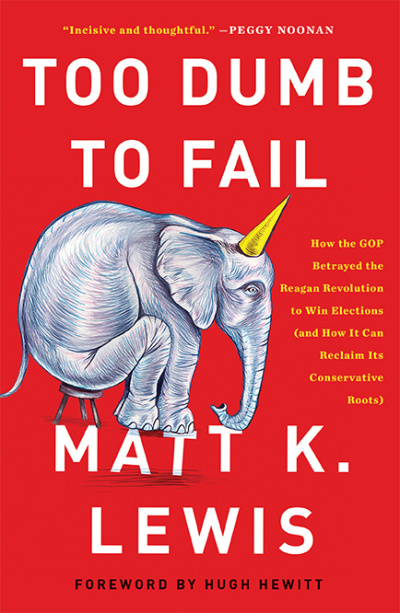Conservative Evangelical Author Matt Lewis on Trump, Evangelicals and Stupid Republicans (Interview)
How did the Republican Party become the stupid party, and what can be done to change it? In Too Dumb to Fail: How the GOP Betrayed the Reagan Revolution to Win Elections (and How It Can Reclaim Its Conservative Roots), conservative columnist Matt Lewis offers answers.

The timing of Lewis' book couldn't have been better. Due in stores Tuesday, publication is just six days before the Iowa caucus.
If you think this is a book about Donald Trump, you're sort of right. The current Republican presidential frontrunner hadn't announced his candidacy when the book was written, Lewis told The Christian Post in an email interview, but Trump's non-ideological populism has confirmed the book's thesis.
Lewis is not opposed to all forms of populism. He supports populism that rejects corporate cronies working with big government to rig the system for their benefit and at the expense of the "little guy."
But, Lewis writes in a passage that earily fortells Trump, "If, instead, populism represents the demogogic politics of nativism, xenophobia, resentment, know-nothingism, victimhood, bitterness, envy ... and/or protectionism — used as a rhetorical cudgel to manipulate the masses — then count me (and most of the public) out. Unfortunately, it sometimes does. Populism often requires scapegoats."
CP readers will be particulary interested in chapter 5, on the Christian Right. Lewis, an Evangelical Christian, has mixed feelings about the contributions of Evangelicals to the Republican Party's anti-intellectualism.
In the afterword, Lewis mentions conservatives who have helped maintain an intellectually vibrant conservatism, and several Evangelicals are on the list, including Russell Moore, president of the Southern Baptist Ethics & Religious Liberty Commission, author and public speaker Eric Metaxas, and Michael Cromartie, vice president of the Ethics and Public Policy Center.
On the other hand, Lewis believes the dumbing down of the Republican Party is partly due to the anti-intellectualism within certain strains of Evangelicalism, and the inclusion of those Evangelicals into the party.
Here is the full CP interview with Lewis:
CP: Why did you write this book?

Lewis: Because conservatism is worth the fighting for, and I saw storm clouds brewing.
I first starting writing about the emerging populism on the Right about five years ago, when I saw U.S. Senate candidates like Sharron Angle and Christine O'Donnell try to ape Sarah Palin, play the victim card, and ultimately lose races that Republicans should have won. Their brand of identity politics ran counter to my brand of conservatism, and I was alarmed to see so many of my conservative friends drink the Kool-Aid.
CP: Given the timing, I'm guessing you were finishing the book as the Donald Trump campaign was taking off. Did the Trump phenomenon cause you to rethink anything you wrote?
Lewis: Donald Trump's candidacy — and Sarah Palin's recent endorsement of Trump — have only confirmed my concerns. Trump isn't a conservative, but his populist rhetoric is enough to garner support from people like Palin who care more about a sort of Right-wing populism than about conservative philosophy.
Interestingly, though, Trump wasn't running when I started writing this book. He has, however, only confirmed my thesis. And frankly, although is rise may be very dangerous on a lot of levels, it has been personally fortuitous for me.
Honestly, it couldn't have worked out any better for someone writing about this topic.
As Dr. Russell Moore of the Southern Baptist Convention recently wrote, "I don't believe in gambling, but if I did I would have encouraged Matt Lewis to play the Powerball lottery."
CP: Trump appears to be appealing to marginal Republicans, and possibly Democrats as well. That would be a way of broading the Republican base. Do you think your ideas for the Republican Party of embracing a more thoughtful true conservatism would be more effective at winning elections than Trump-style populism?
Lewis: There are a lot of substantive policy reasons to oppose Trump-ism. I, for one, fear we are headed to a point where we basically have two tribes instead of parties — where your political affiliation will be solely about your identity, not your ideas. I don't think that would be healthy for America.
But let's put that aside, and just think about pure political strategy. I do believe that in the short-term, Trump's strategy of doubling down on working-class white voters could work. I'm not one of these guys who thinks he has no chance to defeat Hillary Clinton. I actually think that he has a real shot.
My concern, however, has more to do with the long-term ramifications of allowing Trump to rebrand the GOP as essentially a Know Nothing party. In the long-run, the math doesn't add up. Demographically speaking, this is tantamount to suicide.
Again, though, my primary objections to Trump-ism have more to do with the fact that I morally and philosophically object to his demagoguery. The fact that it's stupid long-term politics is just a bonus.
CP: In the 1970's, Evangelicals didn't vote in high numbers and mostly voted Democrat when they did. That changed in the 1980s with the rise of the Christian Right. Today Evangelical voter turnout is roughly the same as the population and about three in four vote Republican. How did the Christian Right change the Republican Party?
Lewis: Too Dumb to Fail talks a lot about faith, and there is also a full chapter dedicated to how Evangelicals impacted conservatism and the GOP. As an evangelical, I can say that our record is mixed.
As a fan of William Wilberforce (my son Becket's middle name is Wilberforce), I am a big believer that people of faith can and should be involved in the public policy process. Christian abolitionists are a prime example of how people of faith can make a positive contribution.
But I also think that some of the anti-intellectualism that we are seeing manifested in today's GOP can be traced back to the addition of Southerners and Evangelicals into the GOP. In terms of evangelicals, it probably goes back to the Scopes Monkey Trial.
I'm of the opinion that we can square a devout faith in God (including the virgin birth, the resurrection, miracles, etc.) with science.
CP: Is there anything you would like see change in the way Evangelicals are involved in politics?
Lewis: There is always going to be a tension when it comes to being in this world, but not of this world. Christians should put their faith first, but work through the political process to bring about positive change.
Too often, I see Christians who are co-opted by politics, and seem to put the City of Man ahead of the City of God. Christians must work to remain compassionate and winsome, and the problem is that politics does not want us to remain that way.
Politicians (and media) have an incentive to stoke fear. We must balance the fact that we live in a dangerous world with the fact that this world is only our temporary home. It is very difficult to achieve this balance and keep things in the proper perspective. Politics is seductive.





















